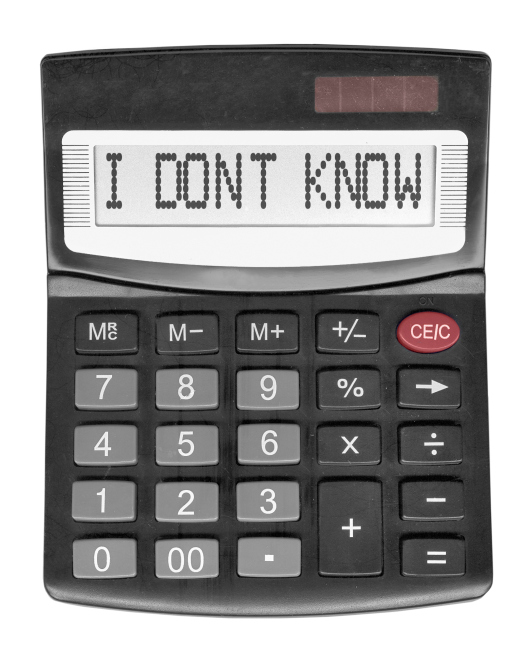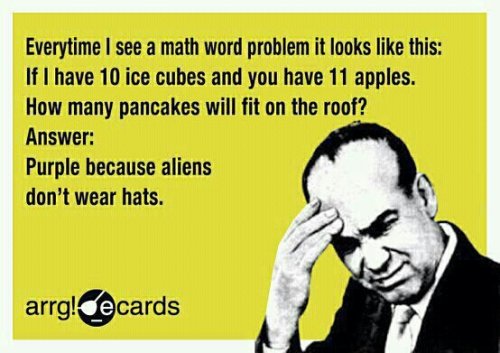Is "I can't do math" like "I can't read"?
Socially, they're polar opposites. "I can't read" marks you as one of the unfortunates, the unlearned, the not too sharp. But an adult who proclaims "I can't do math" suffers no such stigma. In fact, the admission is some kind of social lubricant that connects you with others. It's humility without shame.
Yet math pervades our lives. When we shop, when we cook, when we paint a room, when we construct anything. Photography, drawing, painting, quilting, scrapbooking, woodworking, interior design -- they're all math rich. So long as we don't identify it as math, we manage it. But do our own income taxes? Heaven forbid.
Several years ago, I was charged with teaching math to our classified (non-teaching) staff in the school district. I noticed something remarkable about adults that distinguished them from children learning math: the women (nearly all were women) were much more comfortable with applied math problems than with abstract ones. Ask them to find the radius of a circle and be ready to distribute the Prozac. But ask them to select the right size tablecloth for a table and they have no problem whatsoever.
This ought to be a lesson for math teachers. For as long as we've been teaching math, we've focused on problems. Abstract strings of numbers and function signs, the rules for working with them and sometimes even racing to solve as many as possible in a given time. Tagged on at the end of a problem set would be one or two "word problems", actual applications of the math function being practiced. That's teaching turned on its head.
Imagine you want to teach your child to ride a bicycle. You would begin by teaching her how the bicycle works, the principles of balance, gear ratios and how momentum works, right? Probably not. You would show her how to do it, put her on the bicycle and help her ride. Years later, maybe she'll learn how a bicycle works, maybe not. (By the way, here's a fun physics discussion about bike safety.)
Yet we teach math how we would never teach anything we actually valued. If we cared about math, we would teach it in context. We would learn math as a tool to meet other ends, not as some mysterious unattached bulk that neither teachers nor students can quite grasp the importance of.
My adult learners did well with practical applications partly because they were familiar. But also because the tasks made some sense to them, seemed like something real. Contrast that with typical classroom math, an impractical study akin to memorizing all of the characters in the Star Wars series. Sure, some will love doing it but most of us would resent the time devoted to something so pointless.
Let's reorient our math education. We can do some simple things to connect all kids with math:
Tweet
Socially, they're polar opposites. "I can't read" marks you as one of the unfortunates, the unlearned, the not too sharp. But an adult who proclaims "I can't do math" suffers no such stigma. In fact, the admission is some kind of social lubricant that connects you with others. It's humility without shame.
Yet math pervades our lives. When we shop, when we cook, when we paint a room, when we construct anything. Photography, drawing, painting, quilting, scrapbooking, woodworking, interior design -- they're all math rich. So long as we don't identify it as math, we manage it. But do our own income taxes? Heaven forbid.
Several years ago, I was charged with teaching math to our classified (non-teaching) staff in the school district. I noticed something remarkable about adults that distinguished them from children learning math: the women (nearly all were women) were much more comfortable with applied math problems than with abstract ones. Ask them to find the radius of a circle and be ready to distribute the Prozac. But ask them to select the right size tablecloth for a table and they have no problem whatsoever.
Imagine you want to teach your child to ride a bicycle. You would begin by teaching her how the bicycle works, the principles of balance, gear ratios and how momentum works, right? Probably not. You would show her how to do it, put her on the bicycle and help her ride. Years later, maybe she'll learn how a bicycle works, maybe not. (By the way, here's a fun physics discussion about bike safety.)
Yet we teach math how we would never teach anything we actually valued. If we cared about math, we would teach it in context. We would learn math as a tool to meet other ends, not as some mysterious unattached bulk that neither teachers nor students can quite grasp the importance of.
My adult learners did well with practical applications partly because they were familiar. But also because the tasks made some sense to them, seemed like something real. Contrast that with typical classroom math, an impractical study akin to memorizing all of the characters in the Star Wars series. Sure, some will love doing it but most of us would resent the time devoted to something so pointless.
Let's reorient our math education. We can do some simple things to connect all kids with math:
- Word problems -- in three dimensions when possible -- come first. Solve the real problem, then examine the functions that make this problem similar to so many others.
- Make real world problems more gender balanced. Go ahead and keep your race car acceleration examples, but add in topics more appealing to girls. Demographics, social issues and political ones that also use math.
One of my favorites was a life expectancy problem. In the US, the average person will live 78 years. But the life expectancy for a 30-year old is 80. So how many Americans do not make it to their 30th birthdays? I used algebra to solve the problem. How would you solve it?
- Balance practice and discovery. No one loves endless practice. Perhaps we should treat rote repetition like we treat lectures -- by imposing ten minute time limits. Infuse more opportunities to tackle problems that have varied solution tracks.
- But DO teach the multiplication tables. Being able to multiply in your head makes all later math more accessible.
- Don't be condescending to girls learning math. I personally loved math until my junior year of high school. I was the only girl in a higher math class and the teacher would excuse any confusion I showed over a new concept and found me far more interesting as the focus for his class matchmaking.
- Don't accept "I can't do math" from adults or kids. Ask parents NOT to say such things around their kids. We would never excuse our children's other difficulties with "I couldn't stop stealing either" or "I never ate vegetables either."



Comments
Post a Comment
I'm interested in your comments.